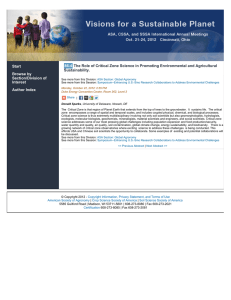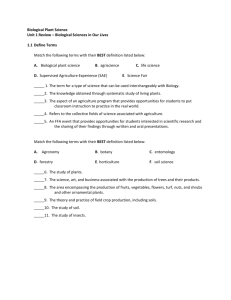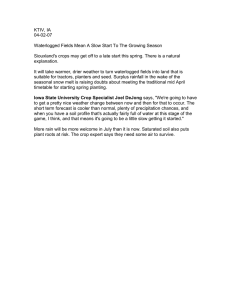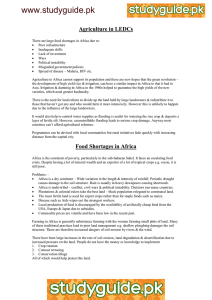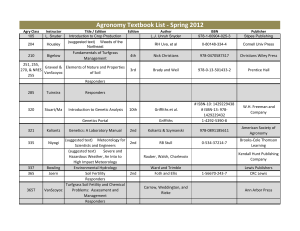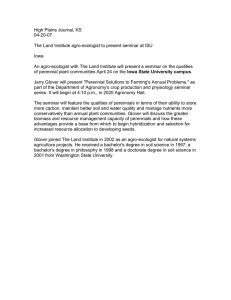Agronomy MAJORS AND PROGRAMS GUIDE TO College of Agriculture
advertisement
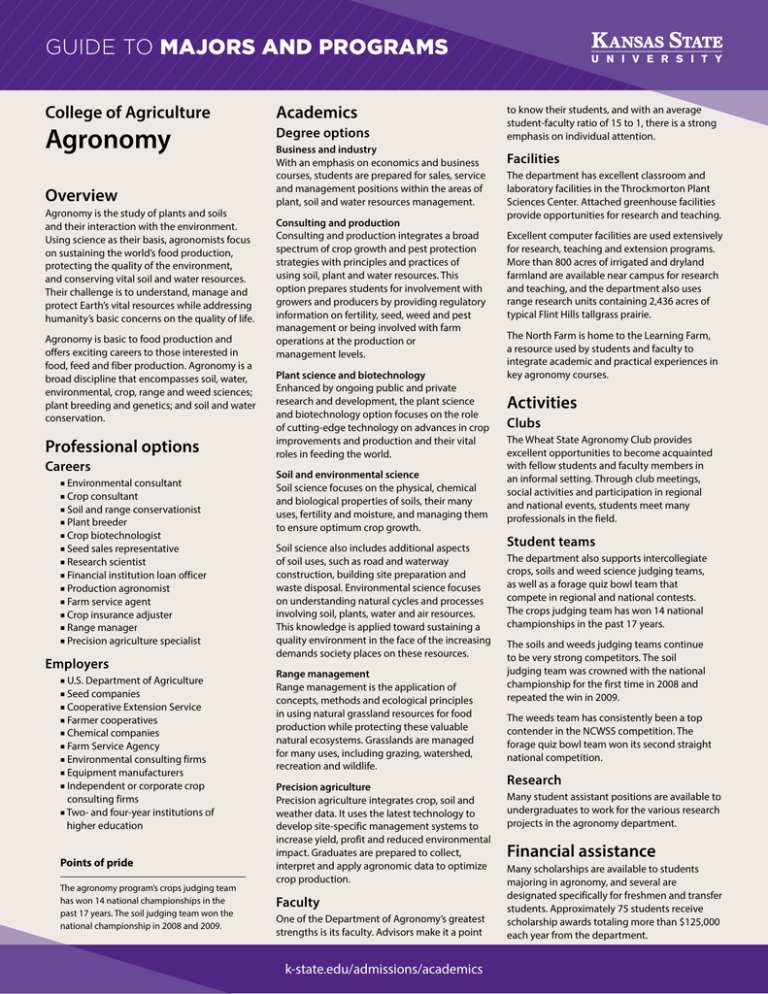
GUIDE TO MAJORS AND PROGRAMS College of Agriculture Agronomy Overview Agronomy is the study of plants and soils and their interaction with the environment. Using science as their basis, agronomists focus on sustaining the world’s food production, protecting the quality of the environment, and conserving vital soil and water resources. Their challenge is to understand, manage and protect Earth’s vital resources while addressing humanity’s basic concerns on the quality of life. Agronomy is basic to food production and offers exciting careers to those interested in food, feed and fiber production. Agronomy is a broad discipline that encompasses soil, water, environmental, crop, range and weed sciences; plant breeding and genetics; and soil and water conservation. Professional options Careers Environmental consultant n Crop consultant n Soil and range conservationist n Plant breeder n Crop biotechnologist n Seed sales representative n Research scientist n Financial institution loan officer n Production agronomist n Farm service agent n Crop insurance adjuster n Range manager n Precision agriculture specialist n Employers U.S. Department of Agriculture Seed companies n Cooperative Extension Service n Farmer cooperatives n Chemical companies n Farm Service Agency n Environmental consulting firms n Equipment manufacturers n Independent or corporate crop consulting firms n Two- and four-year institutions of higher education n n Points of pride The agronomy program’s crops judging team has won 14 national championships in the past 17 years. The soil judging team won the national championship in 2008 and 2009. Academics Degree options Business and industry With an emphasis on economics and business courses, students are prepared for sales, service and management positions within the areas of plant, soil and water resources management. Consulting and production Consulting and production integrates a broad spectrum of crop growth and pest protection strategies with principles and practices of using soil, plant and water resources. This option prepares students for involvement with growers and producers by providing regulatory information on fertility, seed, weed and pest management or being involved with farm operations at the production or management levels. Plant science and biotechnology Enhanced by ongoing public and private research and development, the plant science and biotechnology option focuses on the role of cutting-edge technology on advances in crop improvements and production and their vital roles in feeding the world. Soil and environmental science Soil science focuses on the physical, chemical and biological properties of soils, their many uses, fertility and moisture, and managing them to ensure optimum crop growth. Soil science also includes additional aspects of soil uses, such as road and waterway construction, building site preparation and waste disposal. Environmental science focuses on understanding natural cycles and processes involving soil, plants, water and air resources. This knowledge is applied toward sustaining a quality environment in the face of the increasing demands society places on these resources. Range management Range management is the application of concepts, methods and ecological principles in using natural grassland resources for food production while protecting these valuable natural ecosystems. Grasslands are managed for many uses, including grazing, watershed, recreation and wildlife. Precision agriculture Precision agriculture integrates crop, soil and weather data. It uses the latest technology to develop site-specific management systems to increase yield, profit and reduced environmental impact. Graduates are prepared to collect, interpret and apply agronomic data to optimize crop production. Faculty One of the Department of Agronomy’s greatest strengths is its faculty. Advisors make it a point k-state.edu/admissions/academics to know their students, and with an average student-faculty ratio of 15 to 1, there is a strong emphasis on individual attention. Facilities The department has excellent classroom and laboratory facilities in the Throckmorton Plant Sciences Center. Attached greenhouse facilities provide opportunities for research and teaching. Excellent computer facilities are used extensively for research, teaching and extension programs. More than 800 acres of irrigated and dryland farmland are available near campus for research and teaching, and the department also uses range research units containing 2,436 acres of typical Flint Hills tallgrass prairie. The North Farm is home to the Learning Farm, a resource used by students and faculty to integrate academic and practical experiences in key agronomy courses. Activities Clubs The Wheat State Agronomy Club provides excellent opportunities to become acquainted with fellow students and faculty members in an informal setting. Through club meetings, social activities and participation in regional and national events, students meet many professionals in the field. Student teams The department also supports intercollegiate crops, soils and weed science judging teams, as well as a forage quiz bowl team that compete in regional and national contests. The crops judging team has won 14 national championships in the past 17 years. The soils and weeds judging teams continue to be very strong competitors. The soil judging team was crowned with the national championship for the first time in 2008 and repeated the win in 2009. The weeds team has consistently been a top contender in the NCWSS competition. The forage quiz bowl team won its second straight national competition. Research Many student assistant positions are available to undergraduates to work for the various research projects in the agronomy department. Financial assistance Many scholarships are available to students majoring in agronomy, and several are designated specifically for freshmen and transfer students. Approximately 75 students receive scholarship awards totaling more than $125,000 each year from the department. Suggested coursework Bachelor of Science in agriculture (127 semester hours) Hrs.Courses Core Courses 3 Expository Writing I 3 Expository Writing II 2 Public Speaking IA 3 College Algebra 4 Crop Science 4Soils 1-2 Computer Science 4 Chemistry I 4 Chemistry II 3-5Organic/Biochemistry 4 Prin. Of Biology 4 General Physics I 1 Agronomy Orientation 3 Agric. Econ. & Agric. Bus. or Prin. Of Microeconomics 3-9 Social sciences/humanities electives 3 Communications electives All options except soil and environmental sciences require Principles of Macroeconomics. One of the following courses: International Experience in Agronomy, Agronomy Capstone, Site Specific Agriculture, NRES Capstone. Precision Agriculture option 3 Intro Precision Ag Software 3 Weed Science 3 Crop Growth and Development 3 Soil Fertility 2 Soil Fertility Lab 3 Internship in Agronomy 3 Soil Genesis and Classification 3 Site Specific Agriculture 3 Cartography and Them Mapping 4 Geographic Info Systems I 3 Plane Trigonometry 4 General Physics 3Biometrics 3 Economic Entomology 3 Precision Ag Technologies 3 Princ. Plant Pathology 6 Agriculture Electives 8-12 General Electives Two of the following courses: Environmental Quality, Applications of Nutrient Management, Cropping Systems, Soil Microbiology, Integrated Weed Management, Physical Properties of Soils. Two of the following courses: Remote Sensing of Environment, Geographic Systems Info II, Intro to Unmanned Air Systems, Small Unman Air Design, Intro to Autopilots Mission. One of the following courses: Genetics, Chemical Application Systems/Lab, Sensors and Controls for Ag, Water Management and Irrigation/Lab, Plant Physiology, Fundamentals of Ecology, Crop Diseases. Consulting and Production option 3 Weed Science 3 Crop Growth and Development 3 Soil Fertility 2 Soil Fertility Lab 3 Internship in Agronomy 3 Integrated Weed Management 3 Accounting for Bus. Operations or Farm and Ranch Management 3Biometrics 3 Water Management and Irrigation/Lab 3 Economic Entomology or General Entomology 2 Insect Pest Diagnosis or 3 Insect Pest Management 3 Princ. Of Plant Pathology 2 Crop Diseases 5-6 Agronomy Electives 12 Agriculture Electives 5-10 General Electives One of the following courses: Soil Microbiology, Genetics, General Microbiology, Plant Physiology, Fundamentals of Ecology, Geographic Informational Systems I, General Physics II. Business and Industry option 3 Weed Science 3 Crop Growth and Development 3 Soil Fertility 3 Internship in Agronomy 3 Accounting for Bus. Operations 3 Business and Econ Statistics 3 Economic Entomology 3 Principles Of Plant Pathology 8-9 Agronomy Electives 12 Agric. Econ/Business Electives 3 Agriculture Electives 12-17 General Electives Two of the following courses: Soil Microbiology, Genetics, General Microbiology, Plant Physiology, Fundamentals of Ecology, Geographic Info Systems I, General Calculus and Linear Algebra, General Physics I. Range Management option 3 Range Management 3 Soil Genesis and Classification 1 Field ID Range & Pasture 2 Grassland Monitoring 1 Grassland Monitoring Lab 3 Range Management Problems 3 Range Ecology 2 Range Grasses 3 Range Management Planning 3 Plant Physiology 4 Taxonomy of Flowering Plants 3 Fundamentals of Ecology or Plant Ecology 3 Plane Trigonometry 3 Earth in Action 3 Principles of Animal Science 3 Beef Science 3 Economic Entomology 2-3 Agronomy Electives 3 Biological/Physical Science Elective 12-16 General Electives Soil and Environmental science option 3 Environmental Quality 3 Soil Fertility 3 Internship in Agronomy 3 Soil Genesis and Classification 3 Soil and Environmental Chemistry 3 Soil Microbiology 3 Physical Properties of Soil 3 Earth in Action 1 Geology Lab 3 Plane Trigonometry 3Biometrics 9 Agronomy Electives 14-15 General Electives 12 credit hours from the following courses: Climate Change and Agriculture, Agricultural Meteorology, Watershed Management, Hydrology for Biological Systems, General Biochemistry, Plant Physiology, Fundamentals of Ecology, Chemical Analysis, Intro to Natural Resource Management, Geology and Environment, Geographic Information Systems I, Geomorphology, Fundamentals of Climatology, Remote Sensing of Environment, Geography of Water Resources, Analytical Geometry and Calculus I, Analytical Geometry and Calculus II, General Physics II. One of the following courses: Intro to Archaeology, Environmental History, Geology of Natural Resources, Environmental Sociology. Plant Science and Biotechnology 3 Weed Science 3 Crop Growth and Development 3 Soil Fertility 3 Internship in Agronomy 3Biotechnology 3 Crop Improv. And Biotechnology 3 Contemporary Issues in Global Agriculture 4 Modern Genetics or 3Genetics 3 Plant Physiology 1 Plant Physiology Lab 3 Economic Entomology 3 Prin. Of Plant Pathology 3 Plane Trigonometry 3Biometrics 6 Agronomy Electives 11 General Electives 12 credit hours from the following courses: Plant Genetics, General Biochemistry, Fundamentals of Ecology, Genetics of Microorganisms, Molecular Genetics Lab, Intro to Plant Resistance, Plant Resistance to Insects, Crop Diseases, Plant Resistance to Diseases, Analytical Geometry and Calculus I, Analytical Geometry and Calculus II, General Physics II. For more information about agronomy, contact: Department of Agronomy Kansas State University 1022 Throckmorton Hall 1712 Claflin Road Manhattan, KS 66506–5501 785-532-7258 agronomy@k-state.edu agronomy.k-state.edu For more information about Kansas State University, contact: Office of Admissions Kansas State University 119 Anderson Hall 919 Mid-Campus Drive North Manhattan, KS 66506-0102 1-800-432-8270 (toll free) or 785-532-6250 k-state@k-state.edu k-state.edu/admissions Notice of nondiscrimination Kansas State University prohibits discrimination on the basis of race, color, ethnicity, national origin, sex (including sexual harassment and sexual violence), sexual orientation, gender identity, religion, age, ancestry, disability, genetic information, military status, or veteran status, in the University’s programs and activities as required by applicable laws and regulations. The person designated with responsibility for coordination of compliance efforts and receipt of inquiries concerning nondiscrimination policies is the University’s Title IX Coordinator: the Director of the Office of Institutional Equity, equity@k-state.edu, 103 Edwards Hall, Kansas State University, Manhattan, Kansas 66506, (785) 532-6220. The campus ADA Coordinator is the Director of Employee Relations, charlott@k-state.edu, who may be reached at 103 Edwards Hall, Kansas State University, Manhattan, Kansas 66506, (785) 532-6277. 2016
